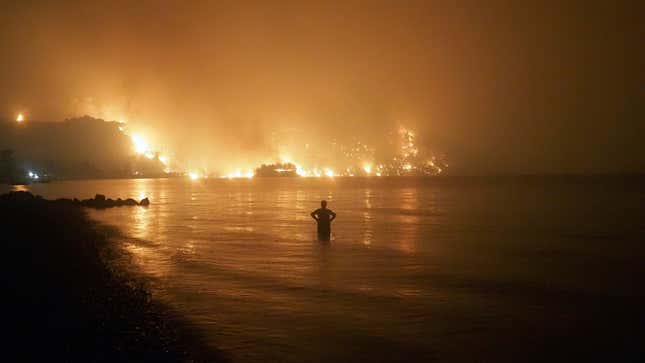
We could be facing a “climate endgame,” and the concept of climate change ending human existence is a “dangerously underexplored topic,” says a troubling new research paper. In other words: We know climate change is going to be really bad, but we’re completely unprepared for the true worst-case scenarios.
“We aimed to develop a rationale and scientific foundation for researching climate calamity: the question of whether climate change could result in global societal collapse, or even eventual human extinction,” lead author Luke Kemp from Cambridge’s Centre for the Study of Existential Risk told Earther in an email.
While you may think that the news about climate change couldn’t get worse, Kent and his coauthors argue that a lot of media and policy attention has actually been focused on the impacts of warming up to 2 degrees Celsius (3.6 degrees Fahrenheit) past pre-industrial levels—a course that we are just barely on track to avoid.
There are a few reasons for this, Kemp said. For one, the goals of the Paris Agreement—keep warming below 2 degrees Celsius at most, 1.5 degrees Celsius (2.7 degrees Fahrenheit) in the best-case scenario—have concentrated most attention on the impacts of lower levels of warming. Scientists often shy away from sounding “alarmist,” Kemp said, in order to keep the public’s attention in the face of misinformation campaigns from Big Oil and other bad actors. And the impacts of more extreme climate change and complex risks, which will bring around huge changes, are harder to study than what may happen with a smaller degree of warming.
This focus on less-catastrophic impacts, the paper authors say, is being reflected in climate research. Earlier research published by Kemp and some of the authors of this paper found that only 14% of the mentions in the latest IPCC report deal with the impacts of climate change that could happen if temperatures reach above 2 degrees Celsius by the end of the century.
“Catastrophic warming scenarios are underexplored,” Kemp said. “Our risk assessments are also simplistic and not suitable for thinking about extreme risks. If anything, we are betting on the best case.”
The signs right now are pointing to us being able to avert the types of disasters laid out in this report. The IPCC in its report earlier this year outlined specific pathways to help avoid 2 degrees of warming; if all nations stick to their existing pledges under the Paris Agreement, we’re on track for just a 1.8 degrees Celsius (3.24 degrees Fahrenheit) increase. Still, the worst case if we don’t meet these targets could be really bad. Politically vulnerable nation states share a “striking overlap” with areas that have the potential to see extreme heat. The paper also outlines what it calls the “four horsemen” of “the climate change end game”: vector-borne diseases, famine and undernutrition, extreme weather, and global conflict. These four factors, the paper states, could be exacerbated by other climate impacts, like sea level rise, as well as enhancing other non-climate risk factors like inequality and misinformation.
The paper, published this week in the Proceedings of the Natural Academy of Science, posits some particularly terrifying potential futures if warming gets out of hand. Kemp said that one of the “plausible worst-case scenarios” would be nuclear war and climate change fusing together: “climate change exacerbates geopolitical conflict eventually resulting in a large-scale nuclear war,” he said. “After the nuclear winter has lifted, the survivors face accelerated warming.” Cheery!
While it may seem like alarmism to throw around these scenarios, the team argues it’s better to be prepared. The paper puts notes how the idea of nuclear winter—an absolute worst-case scenario during the Cold War—galvanized public opinion in the 1980s toward disarmament. Knowing the real risks of extreme warming could help us work harder to avoid them.
“There is nothing alarmist about looking at plausible extreme risks,” Kemp said. “We do it for car and plane crashes without cries of alarmism. It is simply good risk management and science. The alternative of marching blind is naive and potentially fatally foolish.”